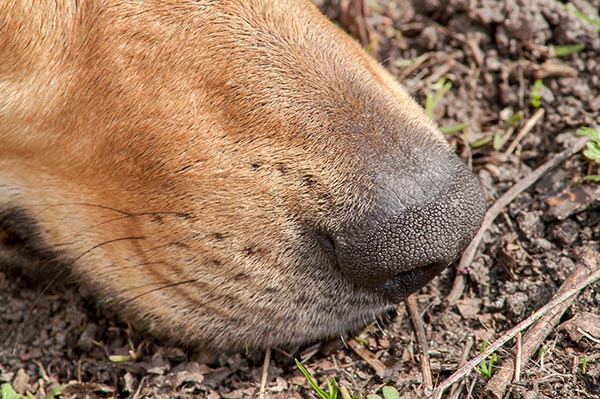Keeping Your Older Dog’s Mind and Body Active: Nosework

Your dog’s days of jumping for frisbees and long hikes have passed, but that doesn’t mean they shouldn’t have a “hobby” they enjoy. Your senior dog will benefit from activities that keep his mind going and gently keep his body on the move as well.
Instead of becoming a couch potato, which can not only diminish his quality of life but also affect his physical well-being – try nosework.
What Is Nosework?
Nosework, also referred to as scentwork, can simply be described as a game of hide-and-seek, where the dog is “seeking” a specific scent. It is a canine sport that is modeled after the work of professional detection dogs, who have jobs sniffing out everything from cannabis to cancer.
Nosework, according to the AKC, “celebrates the joy of sniffing, asking your dog to sniff away, to their heart’s content, giving a purpose to one of their already favorite activities.”
How Does It Work?
In nosework, dogs will search for cotton swabs that have been saturated with a specific set of essential oils – cypress, birch, anise, and clove. The swabs are hidden out of sight in the search area (at the competitive level, there are four main levels of search locations; interior, exterior, containers, and vehicles).
While many canine sports rely heavily on the human handler to give commands and “direct” the dog, nosework is more of a team effort. The handler will give a signal to the dog to “seek!” and from here, the dog is in charge.
Once the dog has found the target scent, he will need to communicate that he’s found it to his human handler. This video from the AKC will give you a better understanding of how it works.
How Would My Dog Benefit From Nosework?
There are many great benefits to nosework, especially for an older dog. Using their fantastic sense of smell, moving their body in a low-stress, low-impact way, keeping their mind working to solve the puzzle of “where is it?” and the confidence boost when they find it, reminding them that they’ve “still got it” even as they age are just a few advantages to nosework.
“As an owner of a senior dog, I want to keep him active, healthy, and having fun. I find nosework a really good option. Not only does it keep him active, it builds confidence, and he loves using his fabulous nose. I love seeing him having so much fun when he finds the scent he is looking for. His whole body language changes, and his tail starts wagging happily when he finds it. Nosework is unique because it is one of the only dog sports where the dog is in charge, the handler is there to help guide the dog when necessary. I feel that one of the most important sayings and truths in scent detection sport is “Trust your Dog,” says Paul Kitwood, owner of Riley (age 11) and award-winning AKC Advanced and Masters Nosework team
Getting Started With Nosework Training
Sniffing something out is a basic canine instinct, so teaching the basics of nosework can be fairly simple. Make a game of associating something positive with the scent you are working with, like a super high-value treat or a quick moment with their favorite toy. You can begin by playing a game of “your choice” where you hold the scent (known as “odor” in the nose work world) in one hand, and high value treats in the other. (In this video, liver treats are used.)
Each time the dog chooses to sniff the hand with the odor, immediately give a treat and a positive “yes!” or “good!” or any word has been known as a “got it!” marker for your dog in the past. Once your dog has solidly made that positive association, you can begin hiding the scent container.
Start very simply, and gradually work your way to more difficult finds. This can be done casually in your living room, or as you progress, if this becomes a major interest for you and your dog, you can enter competitions that will be judged on accuracy and time.
Nosework and The Senior Dog
As a dog ages, just as humans, they tend to slow down, and maybe not seem to need as much attention. They aren’t tearing around, ready to play endless games of fetch or digging up the back yard, but they still need mental and physical stimulation to keep them healthy.
As dogs age, cognitive decline can set in, resulting in irritability, anxiety, confusion, and depression, while physical effects of aging like arthritis can inhibit high-impact movements and running. Keeping your dog mentally and physically active can help keep cognitive decline from creeping in and their body moving without overexertion.
As with any new activity, especially for an older dog who may have underlying health concerns, you should consult with the veterinarian before beginning. Connect with us at Academy Animal Hospital to discuss if nosework is a good choice for you and your dog!
